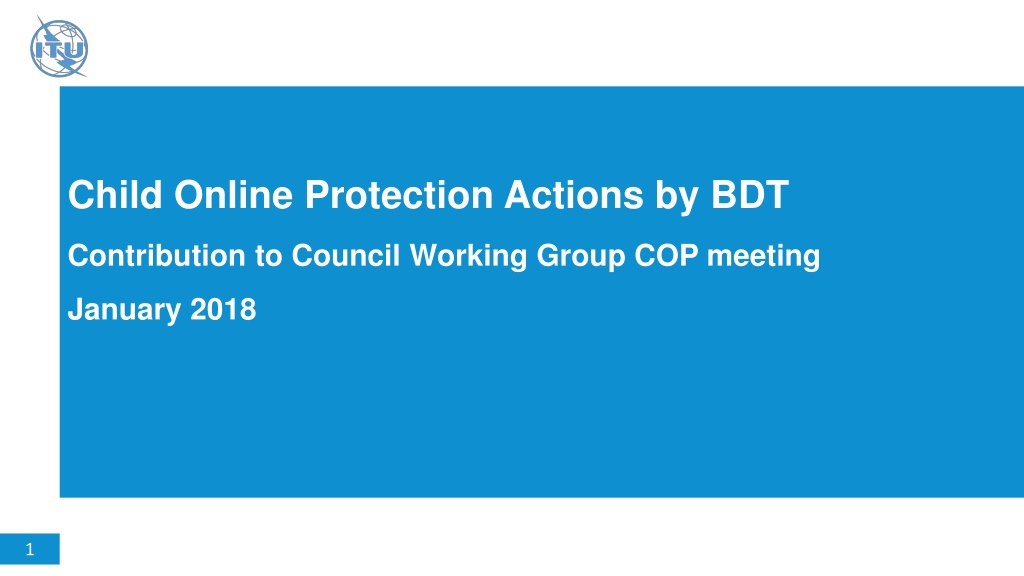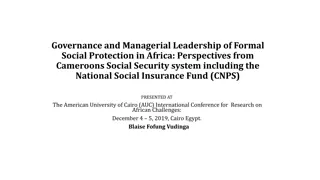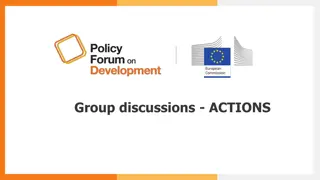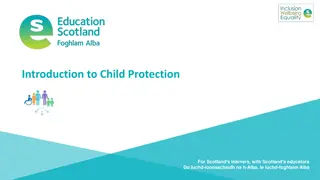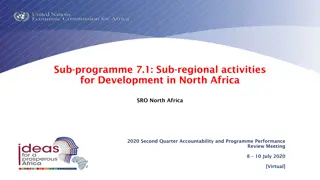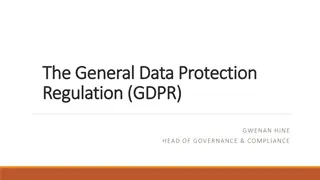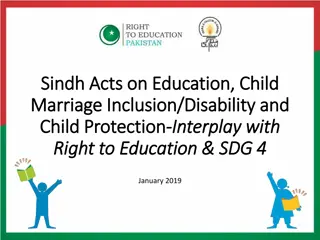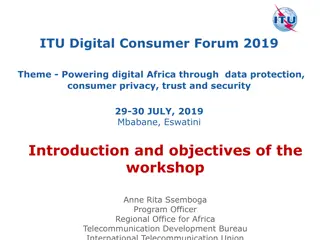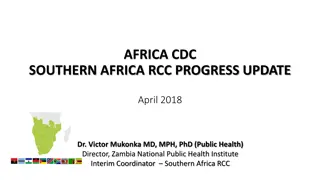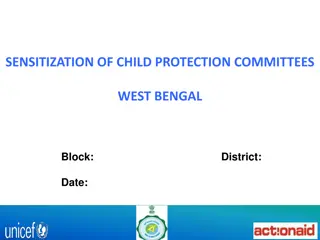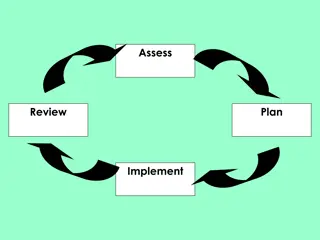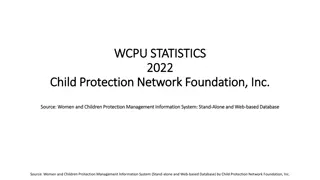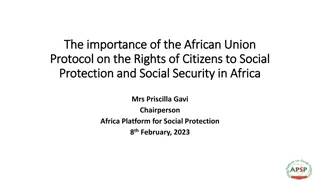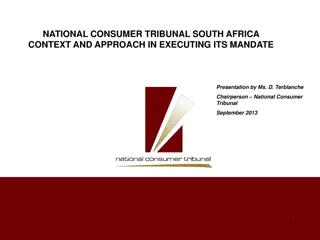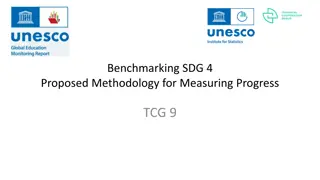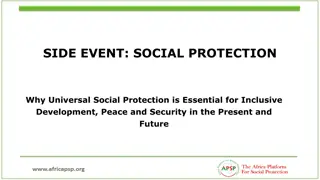Child Online Protection Actions in Africa: Progress and Initiatives
The Child Online Protection (COP) actions in Africa involve a global framework that focuses on capacity building, project management, and national workshops for selecting projects to implement. Various countries in Central, Western, Southern, and Eastern Africa are actively participating and progressing in the COP initiatives. The Africa Regional Office is coordinating efforts and working towards engaging all countries in the region for consultation.
Download Presentation

Please find below an Image/Link to download the presentation.
The content on the website is provided AS IS for your information and personal use only. It may not be sold, licensed, or shared on other websites without obtaining consent from the author. Download presentation by click this link. If you encounter any issues during the download, it is possible that the publisher has removed the file from their server.
E N D
Presentation Transcript
Child Online Protection Actions by BDT Contribution to Council Working Group COP meeting January 2018 1
Child Online Protection Actions by BDT Africa region 2
ITU Africa Region 44 Countries : Angola, Benin, Botswana, Burkina Faso, Burundi, Cameroon, Cape Verde, Central African Republic, Chad, Congo, C te d'Ivoire, Democratic republic of the Congo, Equatorial Guinea, Eritrea, Ethiopia, Gabon, Gambia, Ghana, Guinea, Guinea-Bissau, Kenya, Lesotho, Liberia, Madagascar, Malawi, Mali, Mauritius, Mozambique, Namibia, Niger, Nigeria, Rwanda, Sao Tome and Principe, Senegal, Seychelles, Sierra Leone, South Africa, South Sudan, Swaziland, Tanzania, Togo, Uganda, Zambia, Zimbabwe. 9
COP actions in Africa A global framework has been elaborated selecting 2 pilots countries in each sub-region; After signing of the Project Document countries have to fund the project : Capacity building in Project management and a National workshop aiming to the selection of 2 concrete projects to be implemented. Extension to the other countries is to be conducted progressively. Missions were organized in Chad, Central Africa Republic, Ivory Coast, Congo, Gabon, Kenya
Country assistance CENTRAL AFRICA: CHAD and CONGO CHAD is the pilot country for the whole COP framework implementation. Congo has already signed the PRODOC and has achieved the national workshop. Rwanda has already launched the initiative. Gabon and CAR are considering to sign the PRODOC. WESTERN AFRICA:COTE D IVOIRE and GHANA Cote d Ivoire approved to be the pilot Country. A validation workshop for the COP strategy was held in April 2017. Ghana is considering the PRODOC
Country assistance (cont.) SOUTHERN AFRICA A mission was organized and the national workshop was achieved in Swaziland. South Africa has made progress on its own Mauritius has launched the initiative. Inception workshop on the Development of a national strategy/ framework for Malawi held in November, 2017 EASTERN AFRICA A kick off meeting was organized in Kenya in October 2017and he PRODOC is in the signing process. After ACOP conference in Kampala , Uganda has already started implementing the initiative.
Follow-up and next steps The other countries will be consulted in 2018 as appropriate. Africa Regional Office is expecting all the countries to commit themselves via signed Project Document. Strategy: to use the Universal Service Fund (USF) to implement activities and submit all the selected projects to the ICTDF Committee for complementary funding.
For more information afrregion@itu.int https://www.itu.int/en/ITU-D/Regional-Presence/Africa/
Child Online Protection Actions by BDT America Region 9
ITU America Region 36 Countries : Argentina, Antigua and Barbuda, Bahamas, Bolivia (Plurinational State of), Brazil, Barbados, Canada, Chile, Costa Rica, Colombia, Cuba, Belize, Dominican Rep., Dominica, Ecuador, El Salvador, Guatemala, Grenada, Haiti, Guyana, Honduras, Jamaica, Mexico, Netherlands Antilles, Peru, Paraguay, Panama, Nicaragua, Saint Lucia, Saint Kitts and Nevis, Suriname, Saint Vincent and the Grenadines, Trinidad and Tobago, United States, Uruguay, and Venezuela. 9
COP Actions in Americas Awareness parallel session of Child Online Protection to be organized during the event Cybersecurity week named Cibersecurity from La Plata river . A presentation on ITU activities on COP was delivered at the Seminar Awareness of the dangers and responsible use of the web organized by ENACOM, Argentina, in Buenos Aires in March 2017 An MoU was signed in October 2017 to cooperate with the Pontifical Scholas Occurrentes (http://web.scholasoccurrentes.org/es/)on child online protection, cyberbullying and use of ICTs by young people and children. 9
For more information amregion@itu.int https://www.itu.int/en/ITU-D/Regional-Presence/Americas
Child Online Protection Actions by BDT Arab region 13
ITU Arab Region 22 Countries : Algeria, Bahrein, Comoros, Djibouti, Egypt, Iraq, Jordan, Kuwait, Lebanon, Libya, Mauritania, Morocco, Oman, Palestine, Qatar, Saudi Arabia, Somalia, Sudan, Syria, Tunisia, United Arab Emirates, Yemen 9
2017 COP actions in Arab region A national strategy framework for COP has been developed for Sudan; ARO in collaboration with the Information Technology Institute (ITI) in Egypt organized the Train of Trainers workshop for establishing localized challenge based training curriculum in Cybersecurity for Teens in the Arab region. The objective was to train Arab professionals on the ITI curriculum that is designed based on STEAM inspiring initiative and SAMR methodology to enthuse and engage young students in ICT technology through challenge based activities and cybersecurity skills. 10
Follow-up and next steps The other countries will be consulted in 2018 on the way forward. Arab Regional Office will continue to provide technical assistance to selected Arab countries in the development and/or implementation of their respective COP Action plans in 2018. 10
For more information ITU-RO-ArabStates@itu.int https://www.itu.int/en/ITU-D/Regional-Presence/ArabStates/
Child Online Protection Actions by BDT Asia Pacific Region 18
ITU Asia Pacific Region 40 Countries : Afghanistan, Australia, Bangladesh, Brunei Darussalam, Bhutan, Cambodia, China, Cook Islands, Dem. People's Rep. of Korea, East Timor, Fiji, India, Indonesia, Iran (Islamic Republic of), Japan, Kiribati, Korea (Rep. of), Lao P.D.R., Maldives, Malaysia, Marshall Islands, Micronesia, Myanmar, Mongolia, Nauru, Nepal (Republic of), New Zealand, Pakistan, Palau, Papua New Guinea, Philippines, Samoa, Singapore, Solomon Islands, Sri Lanka, Thailand, Tonga, Tuvalu, Vanuatu, Viet Nam 9
ITU-ASEAN MoU Pursuant to ASEAN-ITU MoU on joint cooperation in ICT Development (2015-2018) signed and endorsed by ASEAN Member States in 2016, one of key cooperation is developing Child Online Protection Regional Framework for ASEAN. ASEAN ICT MASTERPLAN 2020 (AIM 2020) Initiative 7.2 Nurture ASEAN Digital Society Build an ASEAN online community Action Point Description Target / Project 7.2.2 Develop and Foster Cyber Wellness through Guidelines, Education and Outreach Programmes Provide actionable measures to relevant authorities across ASEAN to develop good online behaviors and etiquette, and to be able to respond to cyber bullying and cases of Internet abuse Developing a focused model programme targeting education, advocacy, and engagement around cyber wellness, including: Developing guides and promoting awareness on online risks, particularly to vulnerable groups (children, youth, less-abled), and how they should respond Raise awareness and resilience to new threats and risks online (e.g. the rapid spread of mis- informatioin, cyber-vigilantism and over-sharing of personal and corporate information) Developing measures for child online protection, including communication channels to report harmful content and online abuse to the relevant AMS authorities, with a focus on safety for children Working with the community to establish online forums and exchange on cyber wellness and Internet abuse, with the goal of bringing together stakeholders views Sharing of information and data among countries on trends and challenges in the online space for greater mindshare in formulation of policies and programmes
COP Actions in ASEAN ITU ASEAN Countries Survey In 2016, ITU conducted country surveys on Child Online Protection among ASEAN Member States. ITU and ASEAN jointly organized ITU-ASEAN Workshop on Child Online Protection on 13-14 September 2016 in Philippines. ITU contributed to National Child Online Protection Summit in Philippines on 23-24 November 2017. ITU supported Seminar on Child Online Protection in ASEAN organized by MCMC in Malaysia on 5-6 December 2017.
Follow-up and next steps Pursuant to the outcome of the ASEAN TELMIN 2017, ITU and ASEAN will continue to Develop and implement ASEAN COP Regional Framework. Organize a ASEAN-ITU COP Regional Workshop in Thailand in 2018 Assist ASEAN Member States in developing national COP plans Work in collaboration with partners e.g. UNICEF, Ecpat in implementing action plans for combating Child Online Sexual Abuses
ASEAN Conceptual Regional COP Framework 1. Facilitate policy and legal framework development and harmonization Guidelines, model programmes, etc. 2. Provide a platform for knowledge sharing, e.g. Annual COP forum Online forum 3. Liaise with relevant regional and international stakeholders and partners ASEAN Commission on the Promotion and Protection of the Rights of Women and Children (ACWC) ASEAN Senior Officials Meeting on Social Welfare and Development (SOMSWD) ASEAN Telecommunications and Information Technology Senior Officials Meeting (TELSOM) ASEAN Telecommunication Regulators Council (ATRC) International community e.g. ITU, APT, UNICEF, UNODC, Interpol/Europol, Ecpat, etc. 4. Facilitate reporting mechanisms and programme monitoring and evaluation
Conceptual National COP Framework 1. Define COP landscape Understand what the issues/threats are 2. Develop COP ecosystem Understand who are involved and doing what 3. Review legislative and regulatory frameworks and Action Plans Identify loopholes 4. Develop policies and practical measures Identify objectives, indicators and targets 5. Formulate and implement action plans Apply the five-pillar strategy in implementations 6. Monitor programme implementations Regular reviews and meetings among stakeholders 7. Evaluate the impact Conduct surveys to evaluate results and assess the situation
Country assistance Capacity Building Child Online Protection Workshop Port Vila, Vanuatu 22-24 Sept 14 100 participants Support from the Prime Minister Partners : CTO, Regulator, OGCIO Outcome: Guidelines on COP for Vanuatu COP Guidelines for Brunei : 2014 COP Guidelines for Nepal : 2016-17
For more information aspregion@itu.int https://www.itu.int/en/ITU-D/Regional-Presence/asiapacific
Child Online Protection Actions by BDT CIS Region 27
ITU CIS Region 12 Countries : Armenia, Azerbaijan, Belarus, Georgia, Kazakhstan, Kyrgyzstan, Moldova, Russian Federation, Tajikistan, Turkmenistan, Ukraine, Uzbekistan 9
WTDC-14 Regional Initiative CIS1 - Creating a child online protection center for the CIS region Objective: To provide ITU Member States in the CIS region with centralized advisory and technical assistance on various aspects of child online protection. Results achieved: Multimedia online training course on safe use of the Internet Database of technical solutions for child online protection (content filtering) and software (automated system) for choosing optimal technical solution Automated distribution system of "black" (unsafe) and "white" (safe) lists of Internet resources ITU Regional Workshop for CIS and Georgia on Complex Aspects of Cybersecurity in Infocommunications (Odessa, Ukraine, 15-17 June 2016) 9
CIS RI1 major outputs online training course Multimedia online training course on safe use of the Internet: https://onlinesafety.info/ During first 6 months since launch the course was used by 13,500 unique users from 60 countries 9
CIS RI1 major outputs database Database of technical solutions for child online protection (content filtering) and software (automated system) for choosing optimal technical solution https://contentfiltering.info/ 9
CIS RI1 major outputs automated system Automated distribution system of "black" (unsafe) and "white" (safe) lists of Internet resources https://beta.bwld.online/ 9
CIS RI1 major outputs ITU Regional Workshop on Cybersecurity and COP Venue and date: Odessa, Ukraine, 15-17 June 2016 Participation: 70 delegates from 12 countries Questions discussed: Role of international organizations and Governments in the provision of cybersecurity Policy and regulatory aspects of cybersecurity and COP Technical tools used Capacity-building 9
For more information itumoscow@itu.int https://www.itu.int/en/ITU-D/Regional-Presence/CIS/
Child Online Protection Actions by BDT Europe 36
ITU Europe Region 43 Countries : Albania, Andorra, Austria, Belgium, Bosnia and Herzegovina, Bulgaria, Croatia, Cyprus, Czech Republic, Denmark, Estonia, Finland, France, Germany, Greece, Hungary, Iceland, Ireland, Israel , Italy, Latvia, Liechtenstein, Lithuania, Luxembourg, Malta, The Former Yugoslav Republic of Macedonia, Monaco, Montenegro, Netherlands, Norway, Poland, Portugal, Romania, San Marino, Serbia, Slovak Republic, Slovenia, Spain, Sweden, Switzerland, Turkey, Vatican, United Kingdom 9
ITU Regional Initiative 4 in Europe (EUR-RI4) Objective: To build trust and confidence in the use of ICTs among children and young people in Europe Expected Result: Assistance to the countries in need in the following: 1. Utilizing the existing knowledge on risk and vulnerabilities to which children are exposed in cyberspace and providing best practices 2. Providing a platform to raise awareness on child online protection (COP) and safety issues 3. Developing and implementing roadmaps for national or regional COP initiatives. 7
Survey : Review of National Activities April 2017 Launched at the Regional Preparatory Forum, Vilnius, April 2017 18 countries surveyed Practices collected from 6 countries : Albania, Bosnia & Herzegovina, Romania, Serbia, Slovak Republic, Turkey 39
Areas Covered by the Survey Perceptions of online child safety issues Availability of advice or guidance Availability of awareness raising and related programmes Legal framework and law enforcement resources National focal points Perceptions of the level of co-operation with industry Perceived assistance needed by each country 10
Perceptions of online child safety issues Concerns by countries 12
Regional Review Conclusions Every country in the region acknowledge its responsibility to act to ensure that the internet and its associated technologies are safe for children and young people. Countries increasingly are integrating awareness of online risks into a broader child protection and parenting agenda. National focal points are a key element in effective online protection. All countries should have a well-resourced national focal point that is connected with regional and international initiatives. 18
Regional Review Conclusions In many countries, the legislative frameworks are broadly in line with international and regional legal instruments. However, it is extremely important for every country to ensure its legal measures and legislative framework stay in step with technological developments and changes in behaviour. Advice and guidance on safety online is being provided through several media that target or are used by children. Unified messaging will facilitate and reinforce understanding and reduce potential confusion. 19
Digital Youth Forum, May 2017 The Digital Youth Forum held in Warsaw, Poland on 25 May 2017 500+ youth (14 17 years old) More than 30 schools connected remotely Exposition focusing on digital skills and digital opportunities Operation Uncool Launched 200+ respondents to the query supporting open consultation for the purposes of the ITU Council Working Group on Child Online Protection 20
Operation Uncool, May 2017 Launched in 2016 by RErights.org and ITU s Child Online Protection (COP) initiative Rerights.org : Western Sydney University, the Young and Well Cooperative Research Centre Australia, UNICEF s Voices of Youth and Digitally Connected. Invites young people to explore how their rights relate to their use of digital media and technologies like computers, the internet and mobile devices A consultation inviting young people to share their ideas and experiences. Two rounds of the consultation effected Allows the COP Council Working Group Members to consider young people s opinions and report their concerns to relevant stakeholders so they can reflect young people s needs in policymaking. Third round of the consultation is around the topic of digital skills and education. Survey results will be part of the consultation. 46
Operation Uncool survey results (1) Technology education Searching information, using programmes (excel, word) and staying safe online are most common aspects of technology being taught in schools. Coding, building apps, making videos are aspects that youth would you like to learn at school to be better prepared for the future. Cyber safety training Almost all (94%) youth present have received information or training at school on how to be safe online. School online safety training helps the youth increase their awareness but does not necessarily make them feel safer online. Many young people interact online to indicate their opinions. 21
Operation Uncool survey results (2) Online participation School should focus more on helping the youth to discover/understand the opportunities that new technologies can offer. There is scope to show/tell the youth more about other people using technology to improve their life or the life of others. More actions could be proposed to make the youth more confident in their ability to make the most of what technology has to offer More action could be proposed to make the youth more confident in their ability to use technology to meet their needs now and in the future. Most young people are in online communities. Many young people interact online to indicate their opinions. 22
5th Central European Cybersecurity Public-Private Dialogue Platform, September 2017 Awareness day for Children 13 September Pre Congress stakeholders on a voluntary basis 400+ CHILDREN ATTENDING 23
1st Western European Cybersecurity Public-Private Dialogue Platform, December 2017 Held in Porrentruy, Switzerland 100+ Participants Countries represented :Finland, France, Italy, Romania, Switzerland, USA Awareness day for Children 07 November 23
